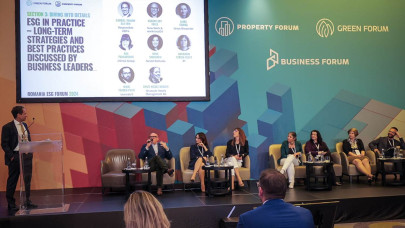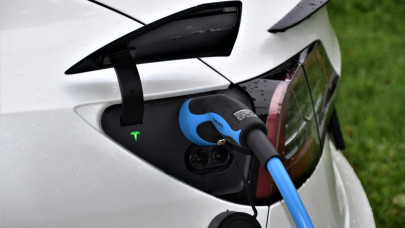How does PwC Romania view the role of green energy and what specific strategies or initiatives does the company employ to promote ESG principles within the energy sector?
While we are aware that the road to climate neutrality by 2050 is arduous and very expensive, Romania is among the countries that have already taken important steps to switch to renewable resources, so we and our clients are on the right track to implement ESG principles.
Our work ranges from regulatory advice to focused strategy, gap analysis assessments, ESG transformational journey, and financial advice. We advise on net zero transformation and decarbonization, climate, risk and resilience assessments, sustainable capital, reporting and disclosure frameworks, and energy solutions projects.
For the energy sector, the transition requires several parameters - the level of economic development, energy demand and supply, national security interests, and a country's position in the energy trade. National energy strategies and state policies play a profound role in the transformation of the energy sector because of their importance for the country's economic development and security. According to the World Bank's recent country report, Romania needs to invest €326 billion until 2050 to develop a decarbonized energy sector. We keep an eye on what is needed for a smooth green transition to advise our clients and also to carry out in-depth analyses.
Can you elaborate on PwC Romania's approach to advising clients in the transition to a more sustainable energy future?
Today in Romania, as in other countries, the corporate sustainability landscape is being shaped by the EU's legislation such as the EU Green Deal, European Climate Law, or the mandatory reporting of ESG factors, which has been transposed into national law. This means that companies now need a strong partner to help them meet this regulatory challenge, both from a financial perspective and, more importantly now, from a complex non-financial perspective.
This regulatory issue is very challenging as there are many factors to consider. For example, if we look at the taxonomy and the way we analyze the indicators that are required of us by this regulation, they are different for industrial companies than they are for other financial institutions such as banks or insurance companies. If for an industrial company we look a lot at revenues and expenses to understand how much of a company's revenue comes from sustainable activities or how much of its capital investment or operating expenses are dedicated to sustainable activities. For a bank, we look at the balance sheet and assets, namely how much of a bank's assets have sustainable objectives.
When it comes to incorporating ESG considerations into their business models, a crucial element is recommending companies engage all stakeholders in every step of ESG risk management. This is because ESG initiatives go beyond the sole responsibility of the leadership team and should be ingrained in the overall organizational ESG strategy.
Regarding internal initiatives, we also discuss the adoption of an internal ESG framework that encompasses various policies and procedures. For example, this could pertain to the handling and resolution of reports from whistleblowers in the public interest, an element incorporated within the governance factor of ESG. However, due to the nature of the facts in the different areas of activity that can be reported, their reporting can have a significant impact on both environmental and social aspects.
How does the company leverage its expertise in sustainability and green energy to drive innovation and collaboration across sectors?
At PwC we approach sustainability from a 360-degree perspective, involving specialists from various areas starting legal to tax, advisory, and assurance. We drive the conversation on sustainability and innovation in the sector by conducting research and publishing reports on sustainability trends, best practices, and emerging opportunities in green energy. Also, as technical specialists, we sit on some technical committees focused on advancing industry standards, fostering collaboration, and driving innovation in sustainable practices within the green energy sector.
PwC's expertise goes beyond regulatory and reporting requirements. Our impact measurement and management solutions provide a roadmap of an organization's impact, identifying opportunities to unlock value and providing insight into hidden risks within the value chain.
As the global focus on ESG investing continues to grow, how does PwC Romania assist clients in aligning their investment strategies with sustainability goals?
The effects of climate change and increased transparency in supply chains, diversity, equity, or inclusion have led to changing customer and employee demands, investor caution, as well as a significant increase in the level of legislation in the field of sustainability, against the background of European and international treaties, such as would be the European Green Deal or the Paris Agreement. In other words, companies face immense pressure to act on sustainability and comply with increasingly stringent regulations.
Companies and investors must strike the right balance between short-term performance requirements and the actions needed to achieve long-term goals. Doing so requires four steps: setting sustainability goals while meeting legal and regulatory requirements, creating your vision around ESG actions, building trust among stakeholders through transparent reporting and relevant indicators, and investing in technologies with an impact on climate change. Companies' appetite to invest in such strategies is growing, and investors' approach to ESG is becoming more sophisticated as their understanding deepens and regulators increase their scrutiny of the data and information that underpins ESG strategies. Therefore, all companies face a major challenge: navigating through strategies and regulations and building a sustainable business model for a new era of ESG-focused investing.
What role does PwC Romania play in helping organizations measure, report, and improve their environmental and social impacts?
We understand how important it is to work alongside clients to embed sustainability across existing reporting systems, integrating technology that enables more insightful decision-making, as well as regulatory compliance—focusing strategy development on business growth and value-creation.
We believe there are five priorities that executive members and their leadership teams should consider when thinking about a more transparent future:
1. ensuring the quality and transparency of reported non-financial data;
2. having a comprehensive, unified, and integrated ESG reporting strategy;
3. the reported information must address the needs and requirements of all categories of stakeholders – shareholders, investors, customers, communities, authorities, ESG rating agencies, and society.
4. The non-financial reporting process must be built with the same rigor as the reporting of financial data and based on grounded and reliable evidence.
5. selecting and using the right digital applications for collecting, processing, and reporting ESG data
In light of these recommendations, at PwC, we have created a range of digital
solutions to meet our clients' needs to manage the transformation effectively brought
about the ESG revolution.














